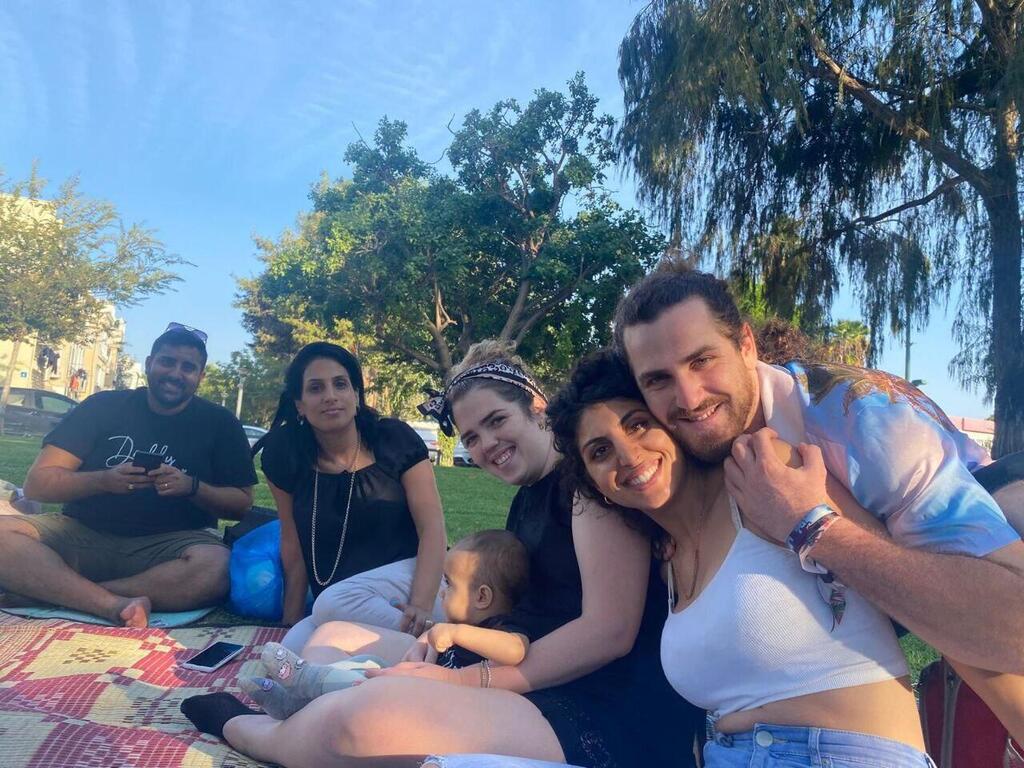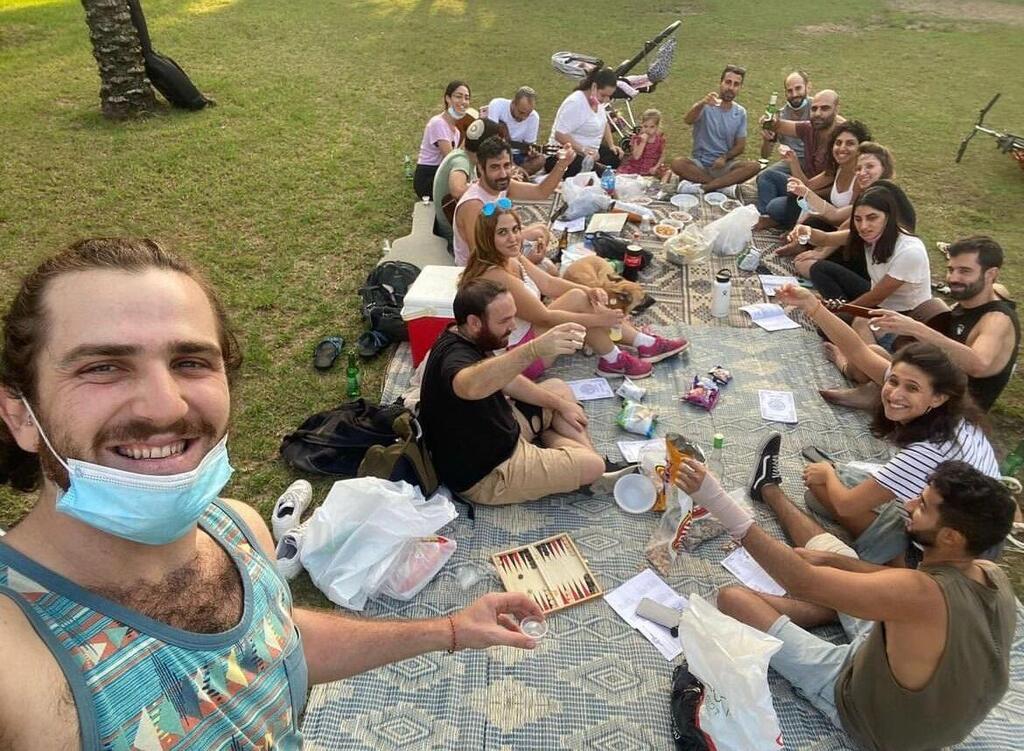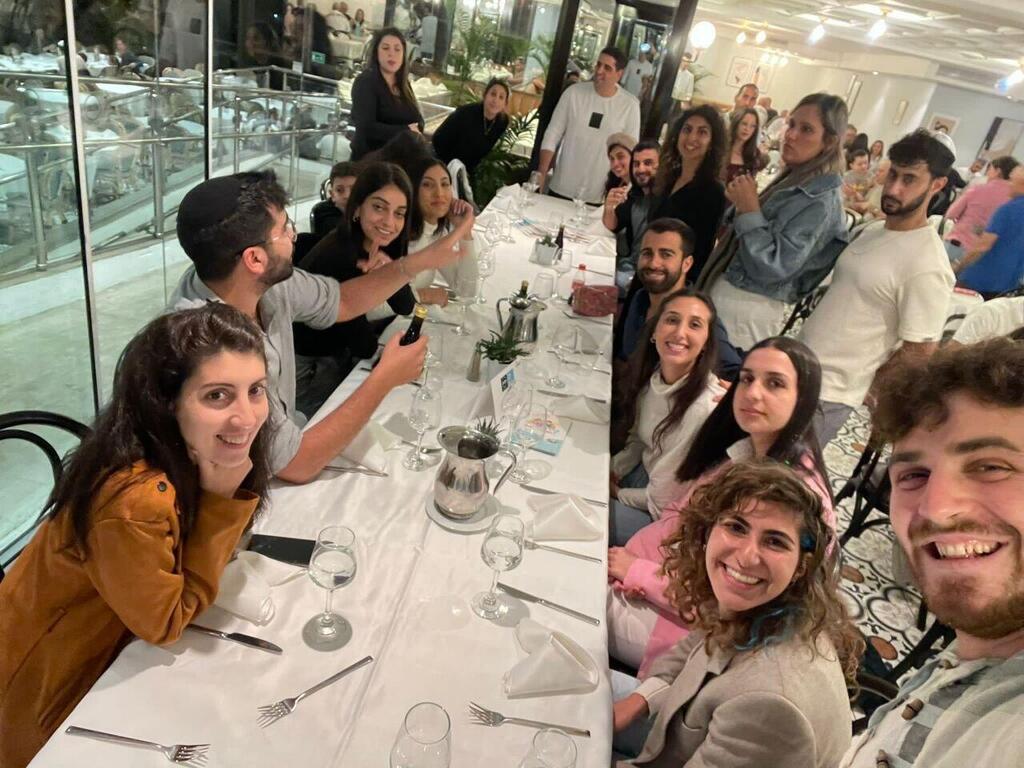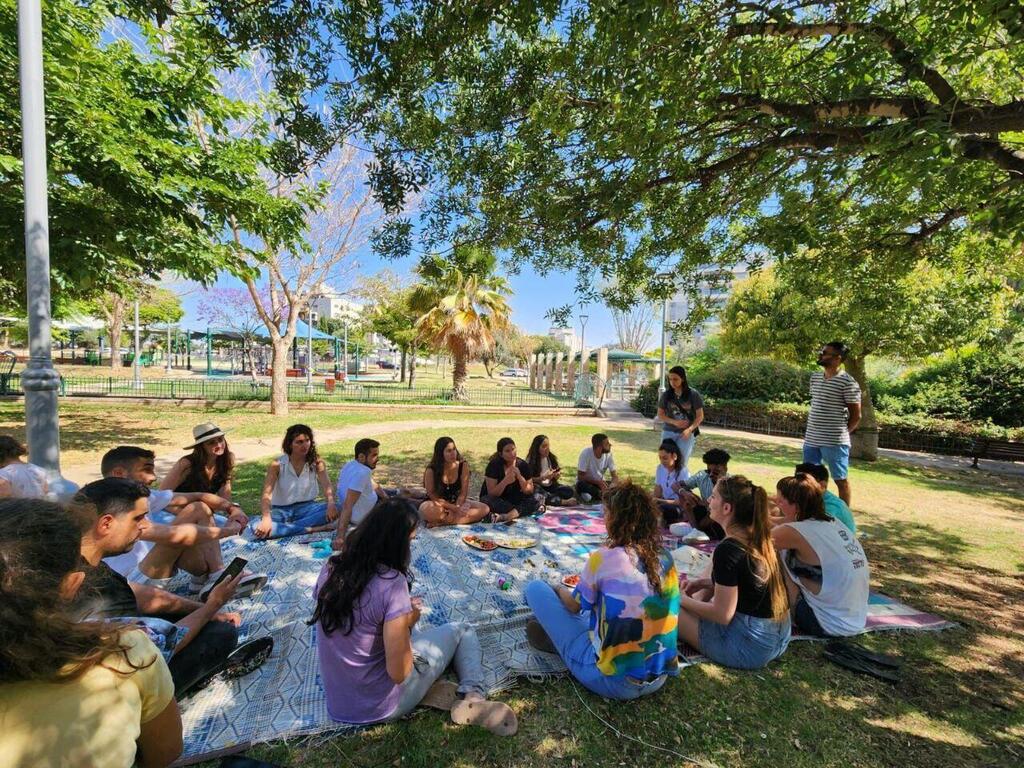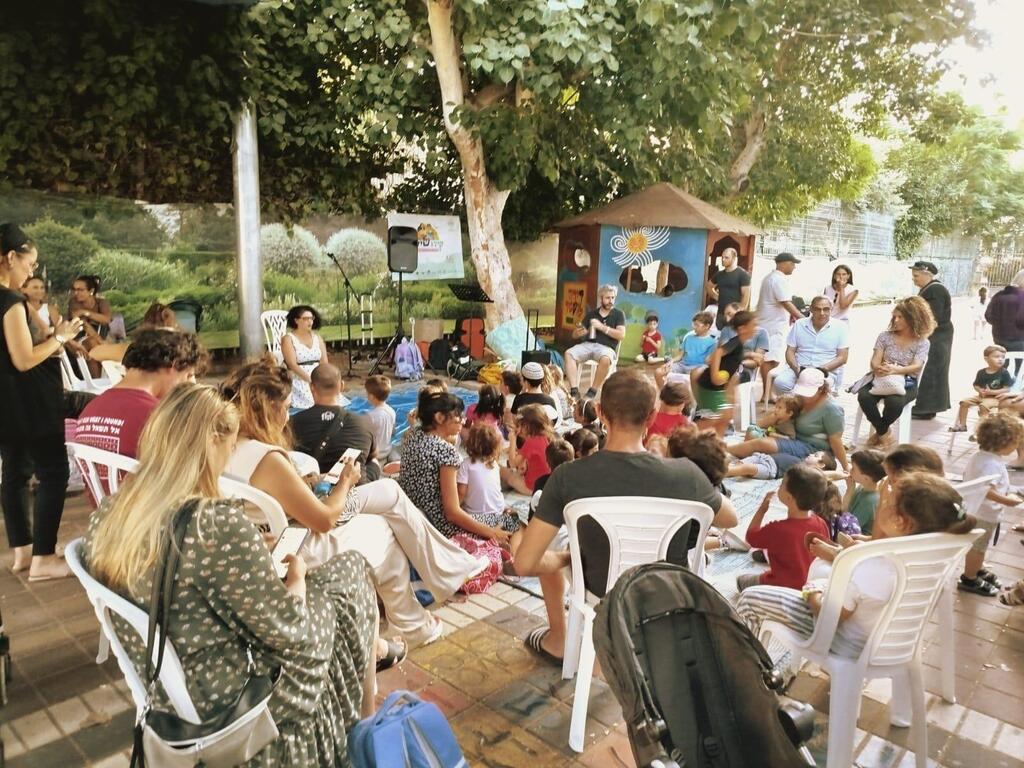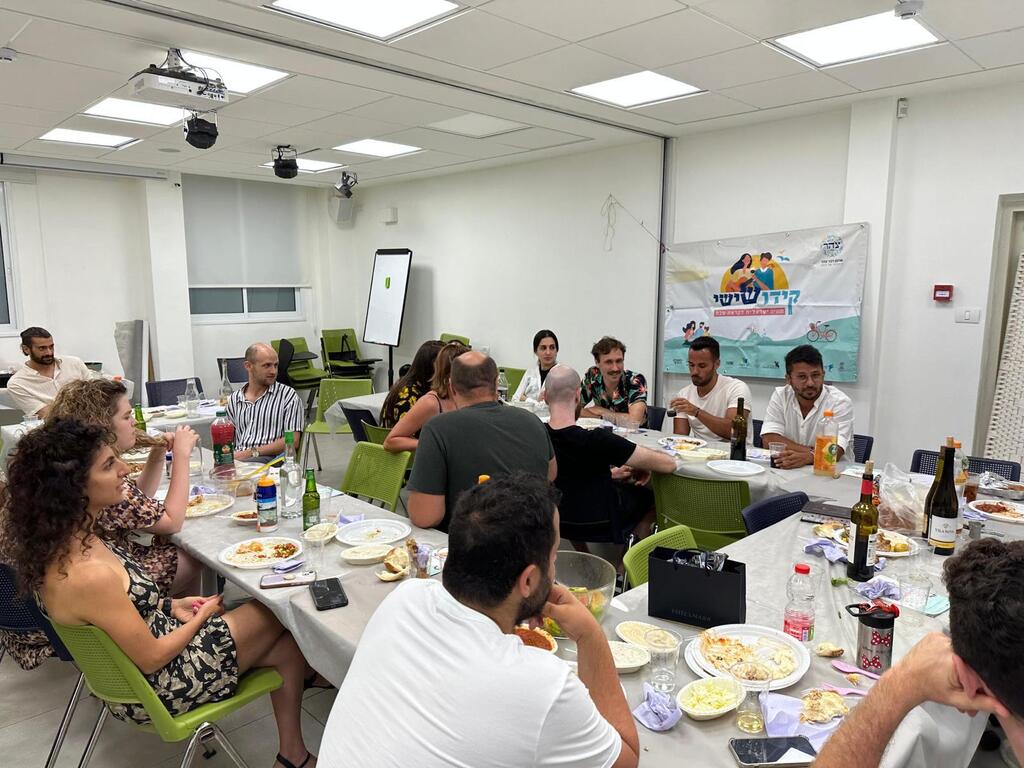Getting your Trinity Audio player ready...
This weekend, over 80 communities from across Israel will commemorate a year since the outbreak of the Iron Swords War as part of Kiddushishi – an Israeli Kabbalat Shabbat event organized by the Tzohar Rabbinical Organization.
In Tel Aviv, the event will be held in memory of Ilan Moshe Yaakov, who was murdered by Hamas terrorists at the Nova music festival on October 7. His partner, Chen Bruchim had organized the initiative alongside him in recent years and now will continue the tradition in his absence, amid ongoing discussions and debate surrounding questions over prayer in the city’s public spaces.
Bruchim, 30, who was born and raised in South Tel Aviv and still resides in the city, manages a community center and is actively serving in the reserves as an intelligence officer. Ilan Moshe Yaakov, in whose memory the event is dedicated, managed to photograph some of the initial moments of the Hamas attack.
"I met Ilan when we were children, and later we even studied together at the same high school, Ort Singalovski," Chen says. "We renewed our connection through volunteering and activity in the Youngsters Developing Neighborhoods community forum in Southeast Tel Aviv. Ilan was a cheerful guy with a huge heart, which manifested itself in a genuine desire to help everyone he could."
Over the past year, Bruchim has heard many stories highlighting Ilan's sensitivity toward others. In recent years, he worked in a youth center in Hatikvah neighborhood, where he accompanied and supported youth in his personal time. There he dedicated himself to deep conversations with the youth and oversaw distributing financial assistance to help teens with military recruitment and admission to preparatory programs—even though some of the teens were not interested in going to preparatory programs or enlisting, and some even had open criminal cases.
"Ilan himself did a year of service with the Aharai! pre-military preparatory program and also worked to establish a pre-army preparatory program for youth from all over the country, aiming to provide them with a framework where they could experience a different path from the existing tracks in the neighborhood," Bruchim says.
"Ilan served in the army’s Duvdevan unit, and even after completing his service, he participated in special operations. Despite all the heroic stories he was associated with, Ilan was a modest guy who traveled the world and won the hearts of people everywhere. That was something that was very clear at his funeral, which was attended by over 2,000 people who came out to accompany him on his final journey."
According to Chen, "For years, our community forum loved holding Kabbalat Shabbat gatherings. Over the last three years, we became familiar with Tzohar's Kiddushishi project, and we welcomed the chance to incorporate their activities into our programs.
"In recent years, Ilan, I, and a few other community members coordinated Tzohar's Kiddushishi events. Ilan was a traditional guy who wanted to preserve the neighborhood's character while also welcoming new residents arriving, creating a healthy and positive blend between the diverse communities."
She recalls, "When Ilan decided to hold a Kabbalat Shabbat, he brought a mat, board games, and refreshments, and waited patiently for passersby in the parks of the neighborhood, even if only a few showed up. It was very important to him to have these gatherings. Since he was murdered, we have dedicated several events in his memory, such as communal Friday night dinners, a Tu Bishvat event, and planting a tree (Ilan in Hebrew) in his honor, and we’ve held sessions to help people process the collective loss and support friends."
This week’s gathering took place at Park Darom in Tel Aviv Friday morning., following a morning run in Ilan's memory.
'Not discrimination or exclusion. Just the opposite'
Participants come from diverse backgrounds—religious, traditional and secular.
The event comes amid tensions where brotherhood, inclusiveness, and mutual respect are not taken for granted. Recently, a petition submitted to the court against the Tel Aviv Municipality's ban on holding gender-segregated prayers in public spaces was rejected, a matter that has ignited religious-secular tensions in the city. Although the Kabbalat Shabbat led by Bruchim is inclusive and held without gender separation, she says she’s ready to defend the right to hold more traditional events in Tel Aviv.
"We believe in respecting each person's beliefs and see utmost importance in allowing those who want to pray to do so, without interference and in accordance with their faith," she says. "We don’t see this as discrimination or excluding anyone. Just the opposite, we respect one another while agreeing that this is our shared religion, even if one of us might connect to the religion more or less. Our goal is to create coexistence based on tolerance for others' beliefs."
The Tzohar Rabbinical Organization, which hosts hundreds of Yom Kippur services around Israel says that "The public prayer held on Yom Kippur in Tel Aviv is not related to religious coercion, exclusion, influence, or anything of the sort. And it shouldn’t be perceived as a slippery slope. It welcomes and unites people, without any need to have any specific label.
"The prayer on Yom Kippur in the streets of the city this year is also part of rectifying what happened last year. Instead of each side trying to 'poke a finger in the eye' of the other, a simple agreement can be reached, so that it becomes a reversal of the events that preceded the Simchat Torah massacre. The prayer on Yom Kippur can be a wonderful lesson in recognizing each person's soul and finding a way not to hurt or trample, nor to lash out or anger."
According to Tzohar, "Within the Yom Kippur prayer, there is a place for gathering, respect, inspiration and goodwill. We believe that the prayer on Yom Kippur in the streets of Tel Aviv will remove barriers and create a dialogue for compromise. We regret that the court chose the path of division and separation, instead of acting towards unity.”
It was also reported that "Tzohar holds open prayers for the public during the Tishrei holidays every year, with thousands participating from all sectors of Israeli society, religious and secular. In its ruling, the court harms their basic right to pray as they have done together for years. We hope that the justice system will repair the damage it’s wrought, so that common sense can prevail. This is entirely possible; it just requires goodwill, trust, and a willingness to respect one another."
Make Shabbat present in Israeli society
The Kiddushshishi – Israeli Kabbalat Shabbat initiative was established about three years ago, with the goal of promoting a Shabbat feeling within Israeli society through social and community gatherings. Dozens of communities across the country participate in the initiative, each holding a series of Kabbalat Shabbat meetings on Friday afternoons. The project is intended for both secular and mixed communities. Some communities focus solely on community members, while others open the events to the public so that everyone can participate.
The events typically take place in public spaces and include songs and music alongside educational content and family activities, each location with its own specific feel and style. A record number of 83 communities will hold Kiddushshishi events this week dedicated to marking a year since the war. The Tzohar organization has produced a special booklet for community coordinators, with content and ideas for conducting the ceremony.
"The Kiddushishi initiative was created to bring Shabbat into Israeli society through community gatherings that connect people. Within the project, dozens of communities participate, and this coming Friday, all the project communities will hold Kabbalat Shabbat gatherings, each in their own particular way," says Esti Wolfson, director of the holidays department at Tzohar.
"In light of the security situation, communities in areas under high threat may not be able to hold the meetings, but we are fully attentive to the Home Front Command's guidelines and will act accordingly."
According to Wolfson, "The Kabbalat Shabbat varies significantly from place to place. The beauty of the project is that each community has its own unique take on the gathering. In each of the dozens of communities involved, one can encounter different elements of Shabbat—rituals, discussions, learning, singing, walks and so on.”


